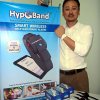Everyone knows that necessity is the mother of invention, but in the case of Geoffrey Tan, founder and CEO of Geob International Sdn Bhd, the proverb was turned on its head as his mother was the driving force behind the device he created.
Mdm Tan asked that Geoffrey come up with a device that would tell them whenever his father was having or about to have a hypoglycaemia attack, a medical event involving abnormally low levels of glucose in the blood that can have serious effects.
As a result of the request, Geoffrey says he put together already existing technologies, such as sweat sensors, on a wristband to create the Hypoband, a device that detects cold sweats, one of the symptoms of hypoglycaemia.
The wristband is paired wirelessly to a smartphone via bluetooth, which then makes a phone call or sends a text message when the Hypoband detects the cold sweat that marks the onset of hypoglycaemia.
The smartphone itself has to have mobile application that decides whether or not to send out an alert based on threshold settings entered by the user.
“We started by engaging research and development firms on how the technology could be pieced together on a printed circuit board,” he said.
This allowed Tan to start the company with no employees or office as all the R&D and manufacturing was outsourced.
“The sensors have to detect a variety of parameters, including the temperature and sweat level of the wearer’s skin,” he said.
Other symptoms of hypoglycaemia include anxiety or nervousness.
“If there is no cold sweat, but the user feels the other symptoms, they can manually press a panic button on their smartphone and a signal will be sent to alert someone,” he said.
The company was founded in 2012 with two other shareholders and RM100,000 in capital, said the former operations manager with an integrated circuit manufacturer.
Thanks to his experience, he was confident he could make the device a reality, despite having to overcome hurdles in funding and marketing.
Help came from Cradle Fund Sdn Bhd via its CIP500 grant and another private accelerator fund which took up equity in the medical device manufacturer, valuing it at RM8mil.
“Our initial expenditure was mainly for manufacturing 500 units of the Hypoband,” he said.
As the company grew, Geoffrey rented a 1,500sq ft office in Bukit Mertajam, Penang, and hired a team of five.
He says that as a startup company, he has to be wise about how funds are spent and building smart partnerships.
“By outsourcing the R&D and manufacturing, we are able to save a lot on the cost of a manufacturing line and workers,” he said.
An electronics manufacturing service company assembles all the electronic components required for the Hypoband.
This is then packaged in boxes designed by a gift box manufacturer before everything is shipped off to distributors.
Tan says that if he had chosen to do all this in-house, it would have required a minimum of RM2mil to purchase machinery for the assembly lines and RM50,000 a month for salaries.
“The components and materials are already expensive as there are no economies of scale,” he said.
The materials, he added, have to be of medical grade to ensure they are non-irritants and hypoallergenic.
Tan added that going into the business has been a great experience because he learnt many new things ranging from export procedures to the requirements for medical devices.
He said the company was currently in the final stages of the ISO 13485 certification which is awarded to firms for the design and manufacture of medical devices.
Aiming to export to European nations, he said the device had to comply with the CE Mark standards requirements, which the company will apply for after the ISO certification.
All this will verify that the device meets all regulatory requirements of the EU’s Medical Devices Directive.
The device, classified a Class 2 medical device requires material, clinical and biocompatibility testing before it is certified.
Tan added that the certification of Hypoband as a medical device, apart from giving customers greater confidence, would also allow users from other countries to be exempted from customs import duties.
“Medical devices are exempted from import duties in most countries, which translates to better margins and more orders as well,” he said.
Tan added that the company was aggressively marketing Hypoband locally and overseas via its website and to pharmacies, hospitals, local and international distributors in the Middle East, Singapore and Malaysia.
Moving forward, the company is planning to work on another wearable device to measure the heart beats and blood oxygen saturation levels in real time which could be part of a remote health monitoring ecosystem.
source:The Star
Bold Wager On Wearables

